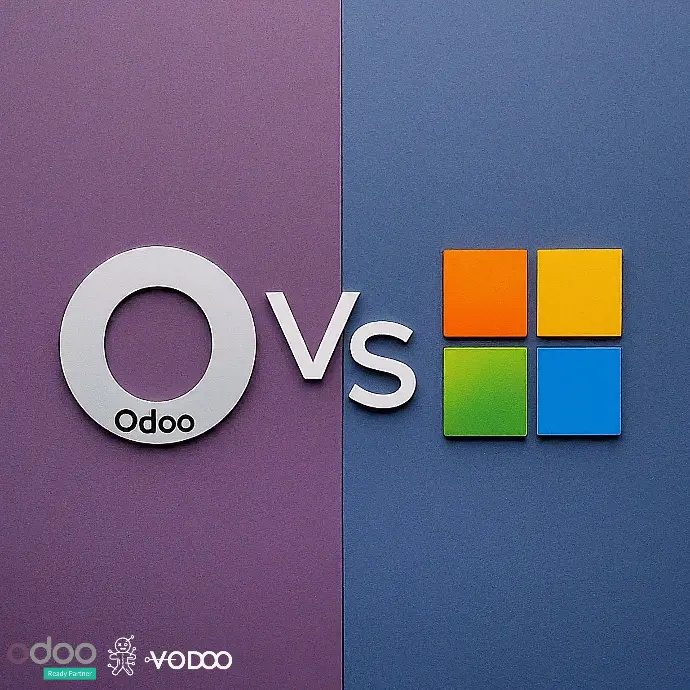🚀 Odoo vs. SAP Business One: Discover the Must-Have Features SAP Business One Lacks! 🚀

🚀 Odoo vs. SAP Business One: Features Odoo Has That SAP Business One Doesn’t 🚀
🔹 Modular and Open-Source Flexibility:
- Odoo: Odoo’s modular design and open-source nature provide exceptional flexibility. You can start with the base software for free and add modules as your business needs evolve. This flexibility allows for extensive customization tailored to specific business processes, making it ideal for companies with unique requirements.
- SAP Business One: SAP Business One is a proprietary solution with a more rigid structure. Customization options are available but limited compared to Odoo. This might restrict businesses looking for highly specific or unconventional modifications.
🔹 Freemium Model:
- Odoo: Odoo offers a freemium model where the core software is available at no cost. Businesses can then choose to purchase additional modules based on their needs, providing a cost-effective entry point. This model is particularly advantageous for startups and small businesses looking to manage expenses.
- SAP Business One: SAP Business One operates on a subscription-based model with no free version. This can lead to higher upfront costs and ongoing expenses, which may be a consideration for smaller businesses or those with tighter budgets.
🔹 Community Support and Collaboration:
- Odoo: With a large, active community of users and developers, Odoo benefits from extensive collaborative support. This vibrant community contributes to ongoing development, provides a wealth of shared resources, and offers support through forums, user groups, and online communities.
- SAP Business One: SAP Business One relies primarily on official support channels. While professional support is available, it may not match the extensive and diverse range of community-driven support that Odoo offers.
🔹 Seamless Integration with Third-Party Apps:
- Odoo: Known for its extensive integration capabilities, Odoo connects seamlessly with a wide array of third-party applications. This includes integration with popular tools for e-commerce, payment processing, marketing, and more, enhancing overall business functionality and interoperability.
- SAP Business One: SAP Business One primarily integrates within the SAP ecosystem. While it supports integration with external applications, it may not be as flexible or extensive as Odoo’s third-party integration options.
🔹 Multi-Language Support:
- Odoo: Odoo provides easy configuration for multiple languages, making it a strong choice for businesses operating in diverse linguistic environments. The platform supports numerous languages and simplifies localization to accommodate global operations.
- SAP Business One: While SAP Business One supports multiple languages, the configuration process can be more complex and less intuitive compared to Odoo. This might pose challenges for businesses with multilingual needs.
🔹 Cost-Effective Customization:
- Odoo: Due to its open-source nature, Odoo allows for cost-effective customization. Businesses can modify and extend the system without incurring significant additional costs, making it a budget-friendly option for tailored solutions.
- SAP Business One: Customizations in SAP Business One can be more expensive. The costs associated with modifying the system to fit specific needs can add up, particularly for businesses requiring extensive changes.
🔹 Wide Range of Industry-Specific Modules:
- Odoo: Odoo offers a broad selection of industry-specific modules, catering to diverse sectors such as manufacturing, retail, healthcare, and more. This wide range ensures that businesses can find solutions that are closely aligned with their industry requirements.
- SAP Business One: SAP Business One has fewer industry-specific modules compared to Odoo. While it offers general functionalities suitable for many industries, businesses with specialized needs may find Odoo’s extensive module library more advantageous.
Conclusion: Odoo stands out with its open-source flexibility, modular approach, and cost-effectiveness, offering a range of features that cater to diverse business needs. Its ability to integrate with third-party apps, support multiple languages, and provide a vibrant community support network further enhances its appeal. SAP Business One, on the other hand, excels in its integration within the SAP ecosystem and is well-suited for larger enterprises with more extensive infrastructure requirements.
For more information or to discuss how Odoo can benefit your business, contact me directly:
📧 Email: [email protected]
☎️ Call: +66-95-891-2598 (Kittipop)
Thai Version:
🚀 Odoo vs. SAP Business One: ฟีเจอร์ที่ Odoo มีแต่ SAP Business One ไม่มี 🚀
🔹 ความยืดหยุ่นแบบโมดูลและโอเพนซอร์ส:
- Odoo: Odoo มาพร้อมกับความยืดหยุ่นสูงด้วยการออกแบบโมดูลและโอเพนซอร์ส คุณสามารถเริ่มต้นด้วยซอฟต์แวร์พื้นฐานฟรีและเพิ่มโมดูลตามความต้องการของธุรกิจ ความยืดหยุ่นนี้ช่วยให้ปรับแต่งตามกระบวนการธุรกิจเฉพาะได้อย่างกว้างขวาง
- SAP Business One: SAP Business One เป็นซอฟต์แวร์ที่เป็นกรรมสิทธิ์ มีโครงสร้างที่ rigid กว่าการปรับแต่งที่มีให้ก็จำกัดกว่า Odoo ซึ่งอาจจำกัดธุรกิจที่ต้องการการปรับแต่งที่เฉพาะเจาะจง
🔹 โมเดลฟรี:
- Odoo: Odoo ใช้โมเดลฟรีซอฟต์แวร์พื้นฐานที่ไม่มีค่าใช้จ่าย โดยธุรกิจสามารถเลือกซื้อโมดูลเสริมตามความต้องการ ซึ่งเป็นการเริ่มต้นที่คุ้มค่าสำหรับธุรกิจที่เริ่มต้นและธุรกิจขนาดเล็ก
- SAP Business One: SAP Business One ใช้โมเดลการสมัครสมาชิกโดยไม่มีเวอร์ชันฟรี ซึ่งอาจนำไปสู่ค่าใช้จ่ายเริ่มต้นที่สูงขึ้นและค่าใช้จ่ายต่อเนื่องที่อาจพิจารณาสำหรับธุรกิจขนาดเล็กหรือที่มีงบประมาณจำกัด
🔹 การสนับสนุนจากชุมชนและความร่วมมือ:
- Odoo: Odoo มีชุมชนขนาดใหญ่และมีการสนับสนุนจากกลุ่มผู้ใช้และนักพัฒนา ซึ่งช่วยให้มีแหล่งข้อมูลที่หลากหลายและการสนับสนุนผ่านฟอรัม, กลุ่มผู้ใช้, และชุมชนออนไลน์
- SAP Business One: SAP Business One พึ่งพาช่องทางการสนับสนุนอย่างเป็นทางการ ความสนับสนุนที่ได้รับอาจไม่ตรงกับช่วงของการสนับสนุนที่ Odoo เสนอ
🔹 การรวมระบบกับแอพพลิเคชันภายนอก:
- Odoo: รองรับการรวมระบบกับแอพพลิเคชันภายนอกได้ดี ซึ่งรวมถึงเครื่องมือยอดนิยมสำหรับอีคอมเมิร์ซ, การประมวลผลการชำระเงิน, การตลาด และอื่น ๆ
- SAP Business One: รวมกับระบบภายใน SAP เป็นหลัก แม้ว่าจะสนับสนุนการรวมระบบกับแอพพลิเคชันภายนอก แต่ความยืดหยุ่นอาจไม่เท่า Odoo
🔹 การสนับสนุนหลายภาษา:
- Odoo: การกำหนดค่าหลายภาษาทำได้ง่าย โดยรองรับภาษาต่าง ๆ และการจัดท่ามกลางการใช้งานทั่วโลก
- SAP Business One: รองรับหลายภาษา แต่การกำหนดค่าอาจซับซ้อนกว่า Odoo ซึ่งอาจเป็นอุปสรรคสำหรับธุรกิจที่ต้องการการใช้งานหลายภาษา
🔹 การปรับแต่งต้นทุนต่ำ:
- Odoo: การปรับแต่งต้นทุนต่ำเนื่องจากเป็นโอเพนซอร์ส ซึ่งช่วยให้ปรับแต่งได้โดยไม่ต้องใช้ค่าใช้จ่ายเพิ่มเติมมาก
- SAP Business One: การปรับแต่งสามารถมีค่าใช้จ่ายสูง และอาจเพิ่มขึ้นตามความต้องการในการปรับแต่ง
🔹 โมดูลเฉพาะอุตสาหกรรมที่หลากหลาย:
- Odoo: มีโมดูลเฉพาะอุตสาหกรรมที่หลากหลาย เช่น การผลิต, การค้าปลีก, การดูแลสุขภาพ และอื่น ๆ ซึ่งช่วยให้ธุรกิจสามารถเลือกโมดูลที่ตรงตามความต้องการเฉพาะของอุตสาหกรรม
- SAP Business One: มีโมดูลเฉพาะอุตสาหกรรมที่น้อยกว่า Odoo แม้จะมีฟังก์ชันการทำงานทั่วไปที่เหมาะสำหรับหลายอุตสาหกรรม แต่ธุรกิจที่มีความต้องการเฉพาะอาจพบว่า Odoo มีความเหมาะสมกว่า
ข้อสรุป: Odoo มอบฟีเจอร์และประโยชน์มากมายด้วยความยืดหยุ่นแบบโอเพนซอร์ส ความยืดหยุ่นในการปรับแต่ง และต้นทุนที่คุ้มค่า SAP Business One เหมาะสำหรับองค์กรขนาดใหญ่ที่ต้องการการรวมระบบที่ครอบคลุมภายใน SAP
สำหรับข้อมูลเพิ่มเติมหรือพูดคุยเกี่ยวกับวิธีที่ Odoo สามารถเป็นประโยชน์ต่อธุรกิจของคุณ ติดต่อฉันได้ที่:
📧 Email: [email protected]
☎️ Call: +66-95-891-2598 (Kittipop)